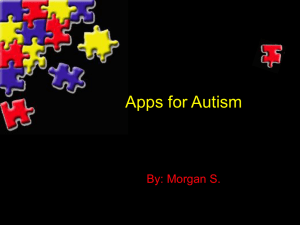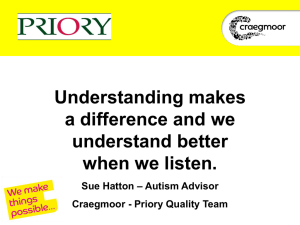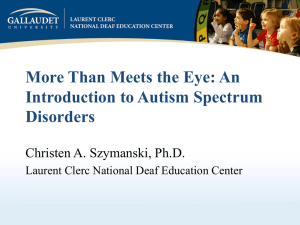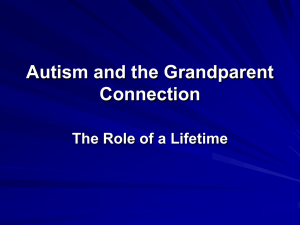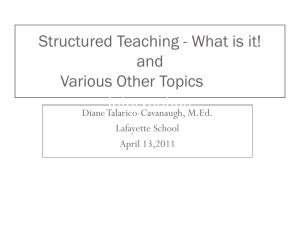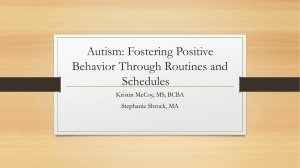HERE - Autism Alliance
advertisement
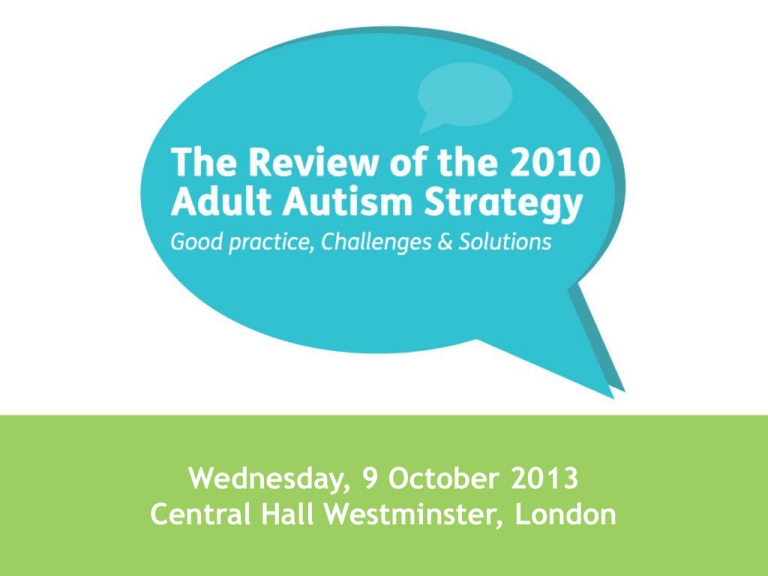
Wednesday, 9 October 2013 Central Hall Westminster, London Welcome and Introduction John Phillipson Chair of Autism Alliance UK CEO of North East Autism Society Autism and me: An interview with Scott James Scott James Singer, campaigner and person with autism Making it real: Living with autism Video feedback from regional focus group Keynote and Q&A Norman Lamb MP Minister of State for Care and Support Where are we now? Challenges in translating policy into practice Jonathan Shephard CEO of Autism West Midlands Adult Autism Strategy: Where are we now? Jonathan Shephard Chief Executive Autism West Midlands Implementing the strategy: the three phases INACTION TALK ACTION • All three are widely represented across different Local Authorities • It’s encouraging that there is widespread interest and commitment • Need to combine energies for joined-up results Falling through the gaps “People with autism have fallen between the cracks” - Andy Burnham • Biggest gap is data – autism is not routinely recorded [and see Brugha prevalence study] • General prevalence is known to be c 1% • Virtually no understanding of how that 1% is made up – from high need to no need, through low or occasional need • Autism is often deliberately misdescribed ... • Because of gap between Mental Health and LD Gap between LD and Mental Health • Autism is not a learning disability and is not a mental health condition • Can lead to a “pass the parcel” mentality • Some trusts are not commissioned to provide services for autism if there is no LD/MH issue • Paradox that least support may be given to those with highest chance of independence ... • ... if they are given timely specialist support Trusts which don’t see people with autism unless MH/LD issues Three main routes to being seen by such a trust are: An appointment is simpler Letter from MP which usually works Referral from GP for “depression” Acquire a mental health issue and come back later ... Or you could display extreme challenging behaviour in public and be referred through the criminal justice system Perverse incentives • Perverse incentive for GPs to misdescribe autism • Perverse incentive for LAs to move people from residential to supported living, because housing benefit will meet part of the cost • This is the right solution for some: we should help people down the ladder of dependency • But if it’s the wrong solution, it breaches the United Nations Convention on the Rights of Persons with Disabilities United Nations Convention on the Rights of Persons with Disabilities This is a treaty obligation and is “hard law”. It includes: • Right to appropriate interventions • Right to services to provide a good quality of life • Obligation on UK to promote availability, knowledge and use of assistive devices and technologies • Opportunity to choose their place of residence and where and with whom they live on an equal basis, and not obliged to live in a particular living arrangement • …. Watch this space! Where the system fails Diagnosis More able children may be diagnosed later; girls may be diagnosed late or not at all Assessment of needs Often by people who do not understand autism Provision for needs Often inadequate Improvement of skills Often neglected Social inclusion Often neglected Employment opportunities Rare Independence of choice Often neglected Public understanding More training needed Wrong assessment of needs • Still a major problem • People with autism, especially if intellectually in normal or high intellect ranges, can present as much more practically able than they are • May be articulate – but unable to use public transport or tie shoelaces or cook • Without proper training, assessors may get it badly wrong – leading to crisis later on Good intentions are not enough • Autism is often counter-intuitive • People with autism need to be understood as individuals • Autism takes time • Autism takes patience Bad intentions are worse • Massive need to get value for money and to cut costs – fully understood • But there is a limit • Anonymised example of a Local Authority seeking to cut costs for highly challenging individuals by 80% – leaving vulnerable people wandering corridors with no support • No reputable provider would take this on We don’t want more Winterbournes • Really important for commissioning to be on value not on lowest cost procurement • There has to be a relationship of trust between commissioners and specialist providers • As providers, we should aim for lower dependency, increasing independence, and lower cost, and should be working with commissioners to achieve this • Autism provision has to be dynamic and aspirational, not a “benign prison” • Winterbourne must not lead to over-emphasis on risk avoidance at the expense of individual independence Good practice: Walsall • Has set up a low-cost innovative befriending service for 30 adults: c £1.5k per adult per year • Aim is to involve people in community and local services, and to reduce social isolation • (too many young adults spend 19 hours a day in their rooms) • Aim is also to improve learning and development of social skills in a natural setting • Focus is on preventative services Good practice: SPARC • Has set up a low-cost innovative befriending service for 30 adults: c £1.5k per adult per year • Collaborative project between leading clinicians; University of Birmingham; Autism West Midlands • No staff; overheads of virtually nil; some clinicians providing services pro bono • Grant from Birmingham City Council for “surround” advice, support and signposting • SPARC is working with 4 LAs, with two more on the way • Example of imaginative co-operation Individual Differences Questionnaire [idQ] © Rachel Golding (2012) Those who describe themselves as neurotypical have profiles like these: The coloured boxes are usually well to the left of the mid line People with a diagnosis on the autism spectrum have profiles like these: The coloured boxes are usually over the mid line for at least 5 categories www.idq.me Good practice: Birmingham • Involved in the SPARC project • Joint Strategic Needs Assessment has a good handle on numbers – predicting future demand • Interested in a befriending project • Funds support groups • Plans to run a joint awareness campaign – posters on buses; local radio • None of this costs a lot of money ... Getting the best value Help into employment Promoting economic independence and self –value Training of front line staff Job centres; GP surgeries; police; checkout staff Specialist training GPs (high need); custody sergeants; Metropolitan police e-crime unit; community nurses; needs assessors Befriending services Low-cost intervention to guard against social isolation Case coordinators Joined-up bureaucracy, and life-event interventions Co-operation and sharing • Hugely dynamic environment • Lots of research into the causes of autism • Considerable technological innovation • Massive amounts of data about what works in practice from the Alliance charities • Understanding is increasing all the time • And yet knowledge is not adequately shared • We have to get to a better understanding of what works, and of how we can improve the lives of the people we support, using the latest knowledge Co-operation: EU-AIMS • Exciting cross-border co-operation between academics and drug companies, with EU funding, led by King’s College London • Unsurprisingly, there is a concentration on development of drugs • That is part of the story, but drug-free expansion of social engagement and life opportunities is also important Unconnected circles ... Academics Policymakers Economists Specialist providers Technologists ... even among academics Educationists Psychiatrists Psychologists Demographers Pharmacologists We can do better than this UK can be a world leader in autism • We need the energising collision of ideas from all sources – academia, technology, practice • We have some of the world’s best: – Academic specialists in autism (and more world class universities than anywhere outside the USA) – Psychiatrists and psychologists – Technological innovators – Economists – Specialist providers of autism services What we now know • People with autism can continue to learn, probably throughout life. They are not “stuck” • Brain plasticity remains and may increase by training • People with autism can learn by analogy – i.e. can transfer trained skills to a different environment • Social skills can be learned; social relationships open the door to learning and life skills • Independence can increase • Investment in specialist interventions works • It is never too late to start Using assistive technology • Potentially massive improvements in independence and in quality of life; plus large reductions in cost • Computer-assisted learning – computers don’t get tired, and don’t have puzzling faces • Smart phones can give prompts in a predictable and user-controlled way [43 steps to making toast] • For some people it allows them to cook independently; for others it allows them to travel independently on public transport – without expensive 1:1 support • The possibilities are endless • And they meet our treaty obligation under UNCRPD Don’t ignore specialist providers • Many autism studies are small-scale and lab-based • People with autism don’t live in laboratories • Alliance charities support many thousands of adults with autism, and have a practical understanding of what works • On its own, this is not enough • We need to be open to new ideas; new research; new assistive techniques • We need a bridge between academia, practitioners, economists, technologists, policymakers and, above all, people with autism and their families Final messages Don’t focus on deficits, focus on aspirations Concentrate on what works in practice Involve people with autism and their families … and if we do all of this … Share information Co-operate Learn from each other We can be world class Awareness, Understanding and Training Jackie Edwards Parent and Family Carer Nigel Archer Criminal Justice Sector Lead for Autism West Midlands and Advisor to the Department of Health Jackie Edwards: A Parent’s Perspective • • • • • • • • Autism & Asperger Syndrome Strengths and weaknesses Social / Learning Disabilities Complex high support needs Behaviour described as Challenging Mental health Sensory sensitivities Communication (including movements) Partnerships & Collaboration • • • • Family carers provide continuity and a history Family carers often see subtle communication Computer and paper files may be limited Working together to gather good quality & Person Centred information • Better outcomes for individuals • Work / Health / Education / Housing /Support • Clear & Consistent Pathways – Diagnosis ASC & the Criminal Justice System The issues and potential solutions Why people with an ASC may become Suspects • Offences relating to social naivety. • People with ASC often adhere rigidly to rules and may become extremely agitated if other people break rules. • Offences relating to a misunderstanding of social cues • Preoccupations with topics, objects, people Special Interests • Offences of an aggressive nature, which are often related to an unexpected change in routine or to the environment, which may cause great anxiety and distress. Issues • Custody • Police Suspect Interviews • CPS • Courts • Probation / YOS / Prisons What is needed? • Tiered autism specific training • Specific ASC marker on IT systems • Simple guidance for operational staff to complement training • Evaluation / Screening at police custody • Referral pathways – specialist services Benefits of police training • 86.9% of respondents felt that the training had proved useful in dealing with a person with autism and enabled them to adjust their methods for the benefit of all parties • In 52.9% of cases where the person with autism was an offender ‘no further action’ was taken against them due, in part, to recognition of the impact of their autism on their behaviours. • Another 14.7% of suspects were referred to other services such as CAMHs or Social Services instead of processing as an offender Financial Benefits? • No exact figures nationally but in 2012 – 5.5% of prisoners in Birmingham Prison had or were suspected to have an ASC (80 individuals) • Potential savings to the CJS ranging from £13,000 to £106,000 per individual as follows: – £13,000 per crime investigated (Social Exclusion Unit figure 2002) – Average 5 x offences prior to imprisonment (£65,000) – £41,000 per year prison costs (‘The Learning Prison’ report) Figures from ‘Adults with Autism and the Criminal Justice System’ a report from Birmingham City Council Health and Social Care Overview and Scrutiny Committee published December 2012 Morning Break Refreshment provided in the Westminster Lounge Morning Break Refreshment provided in the Westminster Lounge Experiences of Diagnosis and Assessment Video feedback from people with autism Beyond Diagnosis: The Challenge of Assessment Charlene Tait Development Director, Scottish Autism Beyond Diagnosis: The Challenge of Assessment Charlene Tait Director of Development Charlene.tait@scottishautism.org Purpose of Assessment • Suitability of placement • Identifying support needs • Selecting appropriate teaching & learning approaches • Measuring progress over time Purpose of Assessment • Suitability of placement • Identifying support needs • Selecting appropriate teaching & learning approaches • Measuring progress over time Areas of Potential Relevance • • • • • • • • • • • Social Communication Social Interaction Flexibility Cognition Working memory Sensory Processing Quality of life Skills for independence Adaptive behaviour Risk Well being The Challenge • Tools • Reliability • Accessibility and training • Cost Tools – Issues & Challenges (Aitken, K. 2013) • Review of 63 tools and techniques relevant to assessment • 40 ( 63%) require a degree of training or use is restricted to specific professional discipline • Range in cost from no charge up to £1096 • Some not commercially available • Some with on costs for materials/score sheets etc Summary • Strategic focus on diagnosis • Need for specialism in diagnosis is recognised but what comes next in terms of identifying and responding to a complex range of needs and contexts? • Assessment and its relevance to evidence based practice and measurable outcomes Improvising access to the appropriate services: The commissioning landscape post-Winterbourne Chris Bull Learning Disability Improvement Lead, Winterbourne Review Lunch A sandwich buffet is provided in the Westminster Lounge Transition and Employment Steven Philp Weston College student and person with autism Joanne Gumbrell Aspire Employment Service Manager, Autism West Midlands The employment catalyst Work vs. Unemployment - Independent finances - Low income / struggling - Quality of life - Isolation - Social opportunities - Inactivity - Routine / structure - Too much time - Positive activity - Loss of skills / abilities - Utilising skills - Feeling ‘unimportant’ - Having a purpose - Impact on mental health The route to employment Increase employability MOTIVATION Achievable job goals Reduce barriers Anxiety Communication Opportunity Sustainability Work trials Early stage intensive support Apprenticeships Competition Work Choice Ongoing mentoring Experience Recruitment processes Work Programmes Access to Work Employable qualities Employer awareness Employer incentives Basic Skills Qualifications Work Choice Discussion workshops Refreshment will be available at workshop venues The case for pooled budgets Professor Martin Knapp Director, School for Social Care Research, London School of Economics London 9 October 2013 The case for pooled budgets? Martin Knapp PSSRU, London School of Economics King’s College London, Institute of Psychiatry NIHR School for Social Care Research 63 Multiple needs and impacts Many causes; widespread impacts Genes Health care Family Social care Income Housing Emply’t Resilience Trauma Phys env People with autism Needs & aspirations Education Crim justice Benefits Employment Events Social netw Chance Income Each of these links is evidence-based Mortality …on many different budgets (England) Genes Health care NHS Family Social care Income Housing LAs CLG Education DfE Crim justice MoJ Benefits DWP Employment Firms Events Social netw CVOs Chance Income Indiv Mortality All Emply’t Resilience Trauma Phys env People with autism Needs & aspirations Each of these links is evidence-based Adults with autism and intellectual disability: how the costs break down NB Family100000 impacts are under-estimated Treatment Emp indiv Emp parents 75000 Family Emp supp 50000 Adult ed Day care 25000 Respite Other HPSS Hospital Accomm 0 Priv HH Supp P Res care Hospital Average cost for a child aged 4-11 with or without intellectual disability Risks … • Silo budgeting • Focus on own KPIs • People ‘fall through the cracks’ • Service duplication Tight budgets exacerbate some of these risks • Short-termism • Statutory obligations • Accountability and public scrutiny Risks … and responses • Silo budgeting • Focus on own KPIs • People ‘fall through the cracks’ • Service duplication Tight budgets exacerbate some of these risks • Short-termism • Statutory obligations • Accountability and public scrutiny • Co-located teams • Multi-disciplinary teams • Joint planning • Joint commissioning • Cross-charging • Organisational mergers • Budgets devolved / pooled to teams • Budgets devolved / pooled to individuals The 2010 Strategy Para 1.34 Above all, the key to enabling adults with autism to play a fuller part in their communities lies in effective local services and support. Therefore the fifth strand of our strategy is to build capacity and capability at local level to enable local partners to develop relevant services for adults with autism to meet identified needs and priorities, learning from what already works and involving adults with autism in developing those services where appropriate. This should include consideration of the approach embodied in Total Place initiatives in breaking down the barriers between different services and increasing the use of pooled budgets to better meet the needs of the whole community. Pooled budgets Pooled budgets – pros o Interdependencies o Transparency o Accountability o Duplication o ‘Falling through the net’ o Complex care and support needs o Flexibility in spending o Access to resources o Out-of-area placements Pooled budgets – cons o Transactions costs (admin, legal etc) o Confusion over reporting, governance o Accountability constraints o Takes time to see benefits; but destabilising o No efficiency gains o Hard to manage short-term funds o Ring-fencing reduces flexibility o Needs ownership Barriers to integration more generally o Structural – fragmentation of service responsibilities, inter-organisational complexity o Procedural – differences in planning / budgetary horizons, cycles and priorities o Financial – differences in funding routes and mechanisms; differences in incentives o Professional – differences in ideologies, values, selfinterest; perceived threats to autonomy, domain and job security; conflicting views about (e.g.) user empowerment o Status and legitimacy – differences between professionals, elected and appointed agencies … leading to asymmetries of legitimacy and accountability Thank you m.knapp@lse.ac.uk 78 Panel discussion & Q&A Jon Rouse Stephen Kingdom Hugh Pullinger Zandrea Stewart Director General, Social Care, Local Government and Care Partnerships Department of Health Deputy Director, Special Educational Needs Department for Education Deputy Director for the Office of Disability Issues Department for Work & Pensions National Autism ADASS Lead Association of Directors of Adult Social Services Key Priorities Zandrea Stewart ADASS • Contribute to the Adult Autism Strategy Evaluation and help consider the next steps • Work with our NHS Commissioning partners (CCG) to consider the needs of people with Autism in their local areas. • Work with local communities, raise awareness & promote equal opportunities for a fulfilling and rewarding life. • Access the right personalised support at the right time Conference closes John Phillipson Chair of Autism Alliance UK CEO of North East Autism Society

